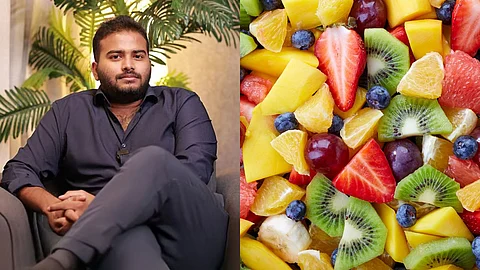

In the first week of February, people in Perinthalmanna in Kerala's Malappuram district were surprised to find exotic fruits from around the world—at prices they could actually afford. And it wasn’t just fruits. Fresh juices and colourful fruit bowls lined the shelves, all neatly priced to fit local budgets.
It was the arrival of Frooos, a bold new fruit retail brand that turned heads and started a new trend. But it wasn’t just a one-store wonder. Frooos was setting the foundation for something bigger—a network of stores across South India.
Behind Frooos is JKH Fruits, a Kerala-based company with 25 years of experience in fruit wholesaling. With a strong grip on sourcing, logistics, and pricing, they’ve now stepped into the retail space—bringing with them a fresh strategy that’s hard to beat.
Spread over 2,000 square feet, the Frooos store in Perinthalmanna isn’t your average fruit shop. It feels like stepping into a whole new world—well-lit aisles, an impressive display of fruits, a juice bar, and bowls packed with freshness.
So where did this unique concept come from? Nizam Hameed, the 23-year-old who leads Frooos, puts it simply: “It’s from our experience. From our years in the trade.”
Nizam is the son of Shahul Hameed, one of the directors of JKH Fruits. He’s joined by Nazmal, the son of another JKH Fruits director, fondly known as Kunjani. While Nizam leads the brand, Nazmal handles the numbers—finance and accounts. The strategy behind the scenes is shaped by a team led by retail expert Jinu Joseph, who has helped many brands succeed across South India.
JKH Fruits started its journey in Palakkad when three friends—Junaid Khan, Ummar (aka Kunjani), and Shahul Hameed—began selling musambi in bulk. Over the years, they grew into one of the country’s top fruit wholesalers. Today, they source over 50 types of fruit from more than 30 countries and supply them across India.
They were also pioneers in Kerala’s fruit market. “Back then, musambi wasn’t even familiar to most people in Kerala,” says Nizam. “And after Vishu, the fruit market used to go quiet. We brought in fruits from different parts of India to keep things moving.”
They also solved a big problem—wastage. Fruits were being transported in sacks, which led to damage. JKH Fruits introduced 20 kg tray moulds to safely carry fruits, cutting down spoilage and saving money.
Frooos builds on this tradition—bringing new ideas to market, without losing the old-school know-how.
For Nizam, this is personal. His father once ran a small fruit shop in Perinthalmanna between 1985 and 1990. But it ended in loss and debt. That experience forced his father to leave the town and start over. Years later, Nizam chose the very same town—Perinthalmanna—to open his first Frooos store.
“I grew up watching my father work late nights, loading fruit trucks and managing stock,” says Nizam. “Eventually, I started helping too. Later, he sent me across India and abroad to learn about fruit sourcing firsthand. That’s what gave me the confidence to start Frooos.”
It’s no surprise that Nizam’s fresh ideas and bold steps caught attention—even at the Retailers Association of India’s leadership summit in Mumbai.
"I wanted to build a retail brand people would know and love,” says Nizam. JKH Fruit is strong in wholesale, but not many know about us. "I wanted to create something that directly connects with people. Since I’ve always been around fruits, Frooos felt like a natural step. We chose the name because it sounds like ‘fruits’—but with a twist."
Fruits like apples, berries and avocados are no longer just for the elite. Young people and middle-class families are now adding them to their diets for health reasons. Frooos wants to make exotic fruits affordable and available to everyone.
Currently, imported fruits pass through three or four middlemen before reaching your local shop. That adds to the cost. Frooos sources directly from the origin and sells straight to customers. With no middlemen and smart logistics, they save money—and pass those savings on to shoppers. That means even exotic fruits can come at pocket-friendly prices.
Frooz has a clear roadmap till 2026. Right now, there’s just one store in Perinthalmanna. But on April 26, three new showrooms will open in Kozhikode and Kochi.
After that, outlets are coming to Thrissur and Thiruvananthapuram. In Kakkanad, they’re planning a large experience centre where people can learn, taste and explore everything about fruits.
Frooos is aiming for around 18 stores across Kerala. In Bengaluru, three stores will open soon, followed by eight more. Chennai, Coimbatore and Mangaluru are next. Eventually, they plan to launch in Hyderabad too.
In total, over 40 outlets are planned in the first phase.
“Fruits are delicate. If not displayed properly, they spoil quickly,” explains Nizam. “We want to bring the best fruits in the best possible way. That itself will be a new experience for most people.”
These experience centres are designed to make fruit shopping fun, educational and memorable.
This isn’t just about business. It’s about bouncing back from failure.
Shahul Hameed, Nizam’s father, once ran a fruit shop in Perinthalmanna. The losses were so big, he had to leave the town. But he didn’t give up. He travelled, learned the trade, and returned stronger.
With Junaid and Ummar by his side, he started JKH in 1999–2000. The name comes from their initials—Junaid, Kunjani and Hameed.
Starting with just musambi, they slowly expanded, learning how to store and transport fruits better. They introduced 20 kg fruit trays to Kerala for the first time and reduced wastage dramatically.
Today, JKH distributes 300–400 tonnes of fruit every day. They own a fleet of 75 vehicles and are among India’s leading wholesale fruit distributors. In Kanjikode, Palakkad, they’ve set up a state-of-the-art cold storage and logistics hub across 8.5 acres.
Once buried in debt, they now run one of the most powerful fruit networks in South India.